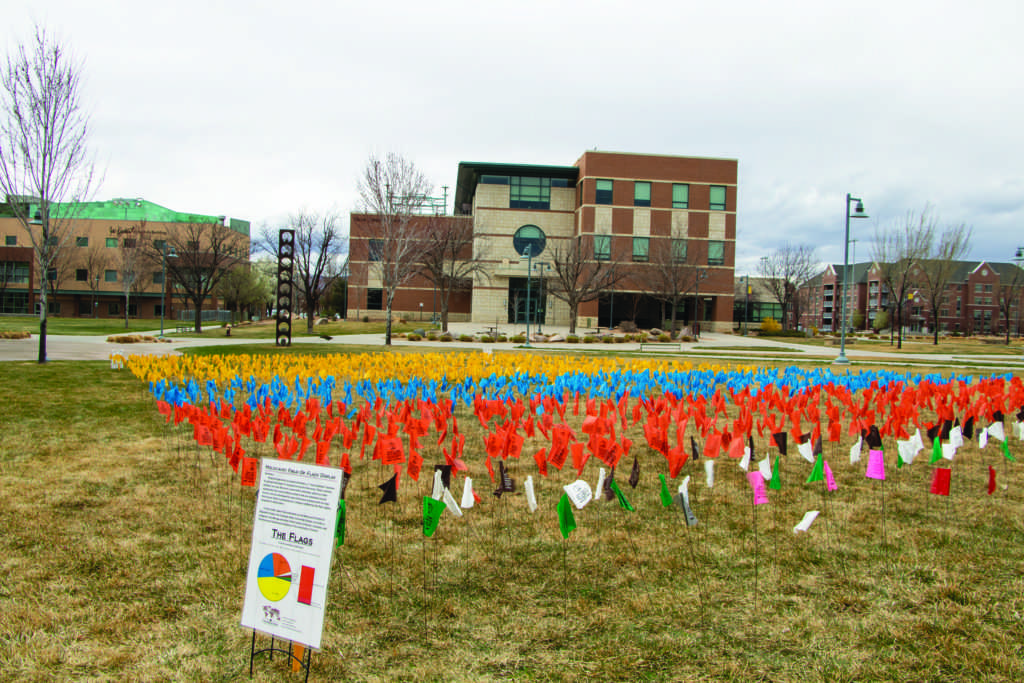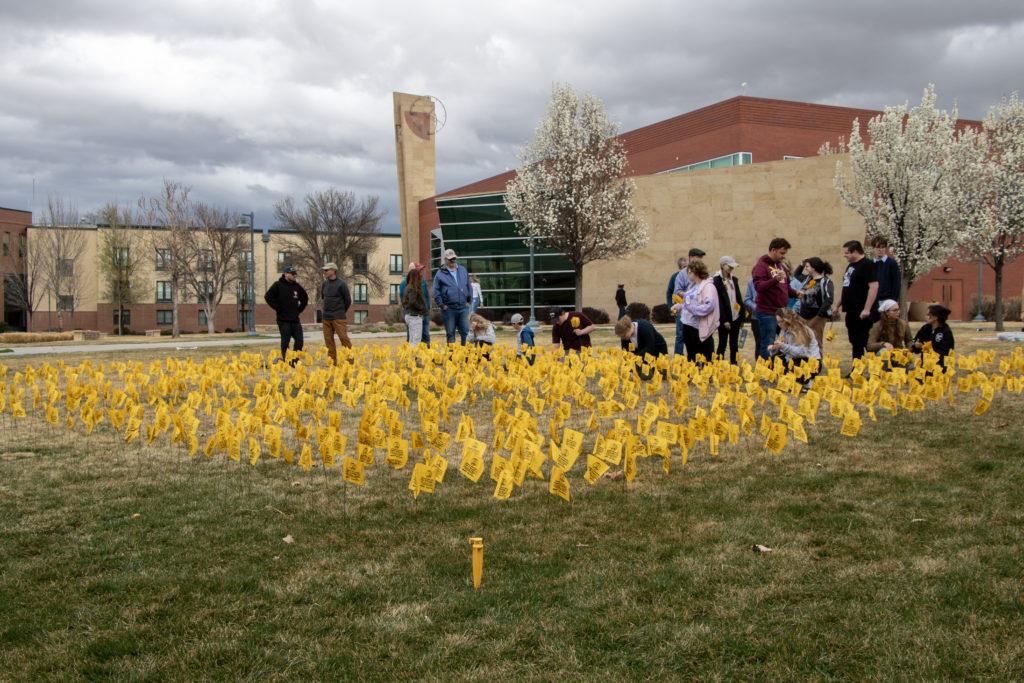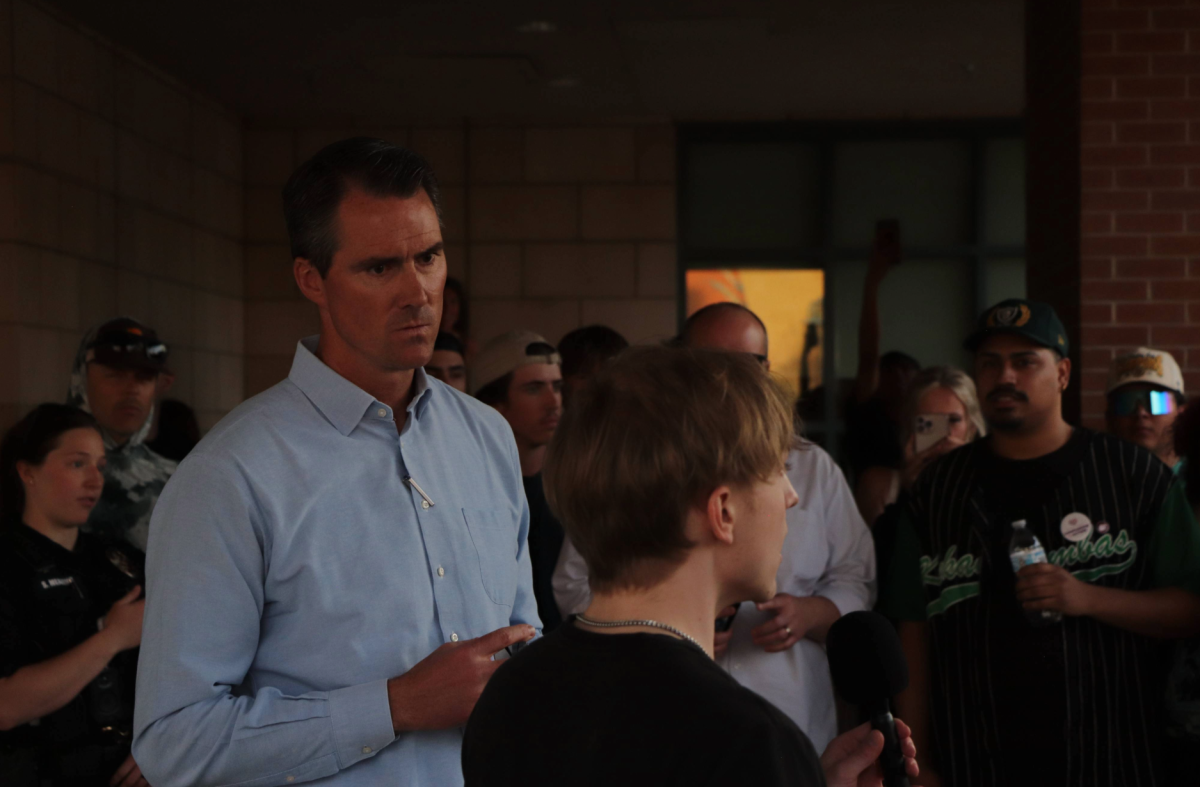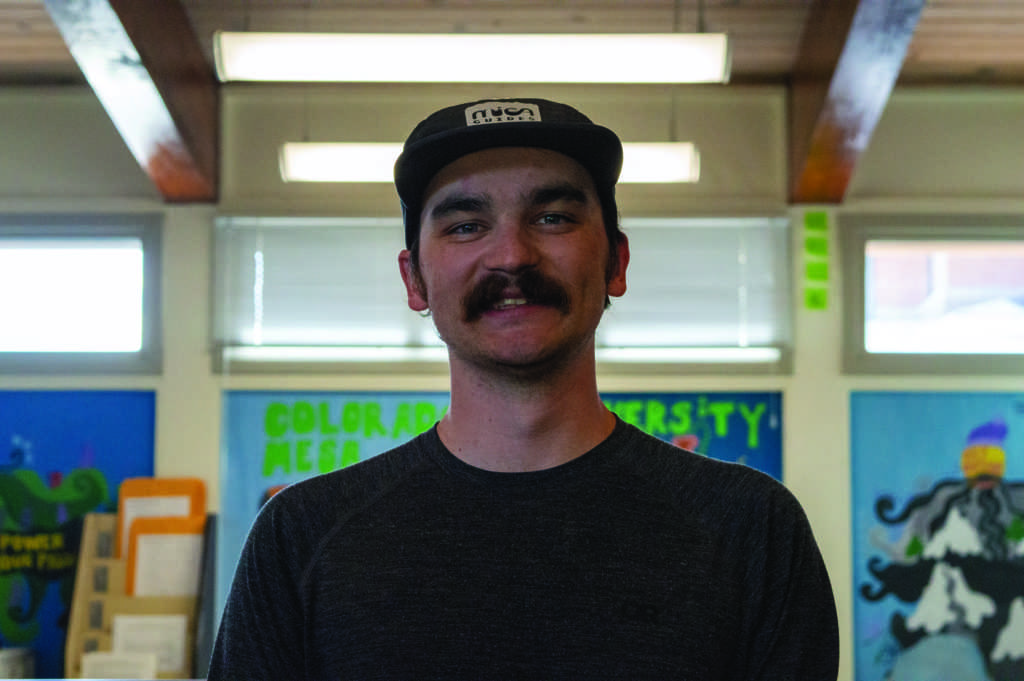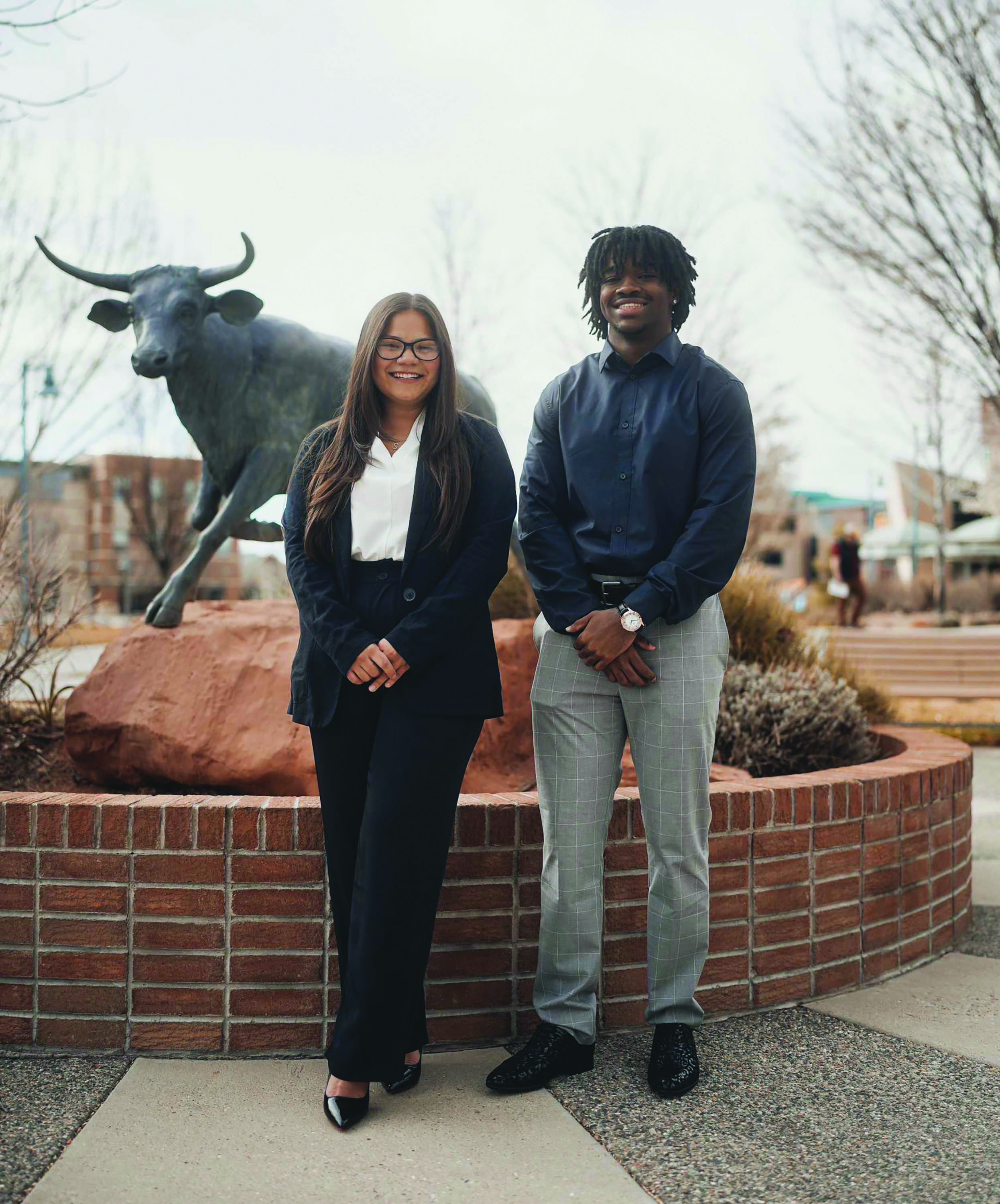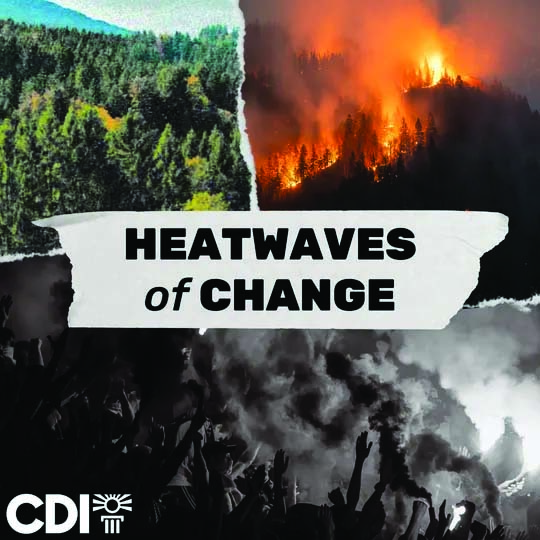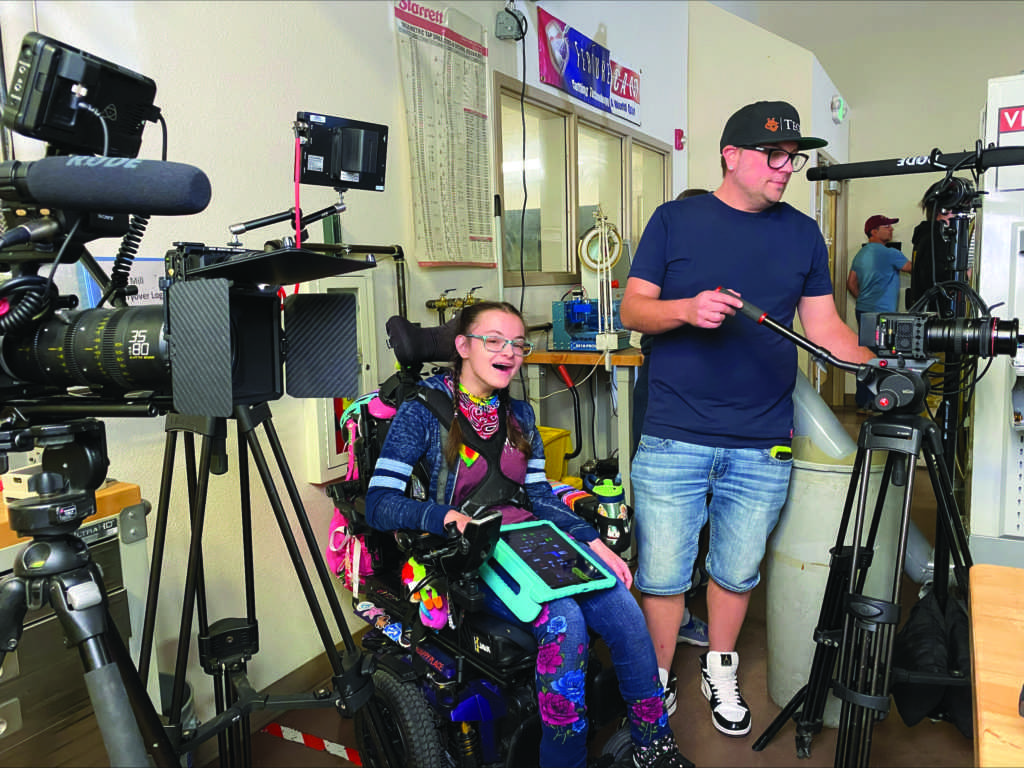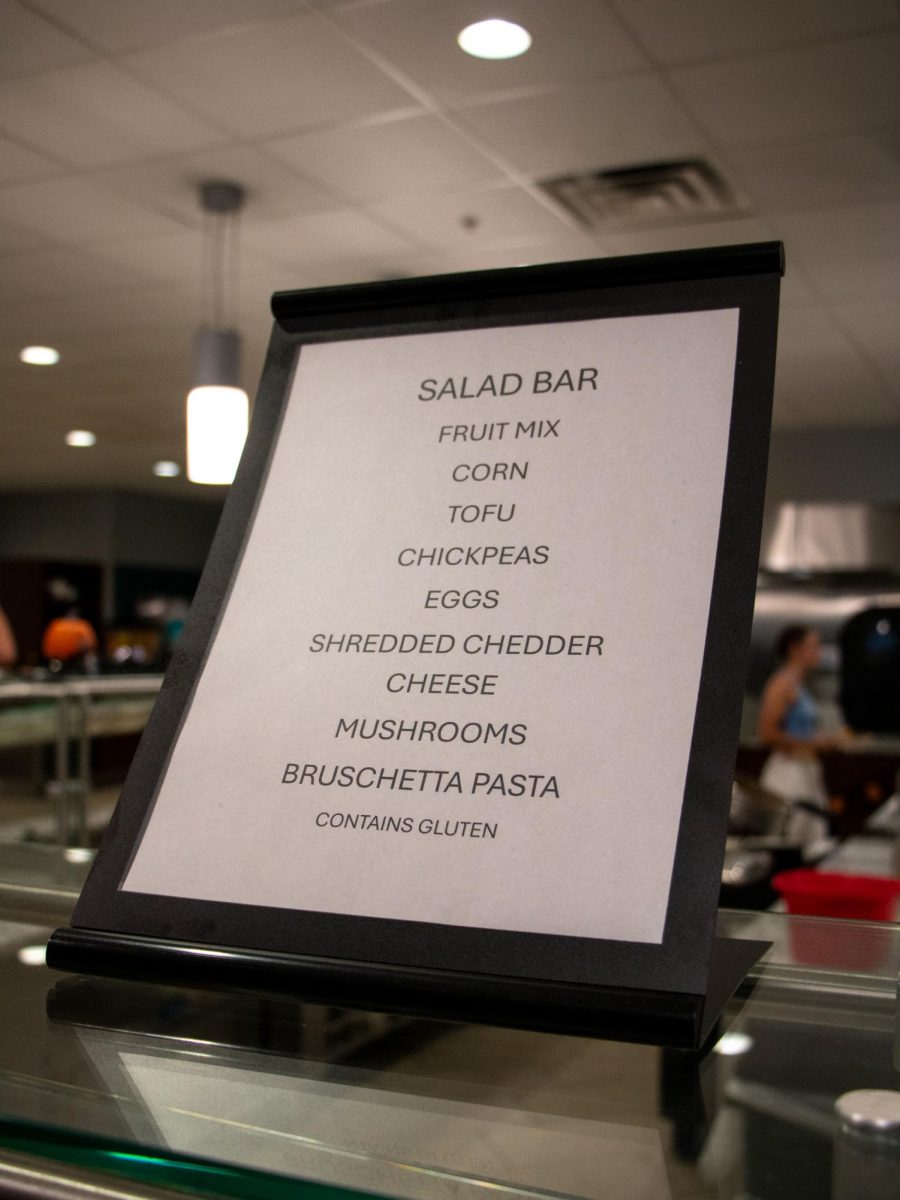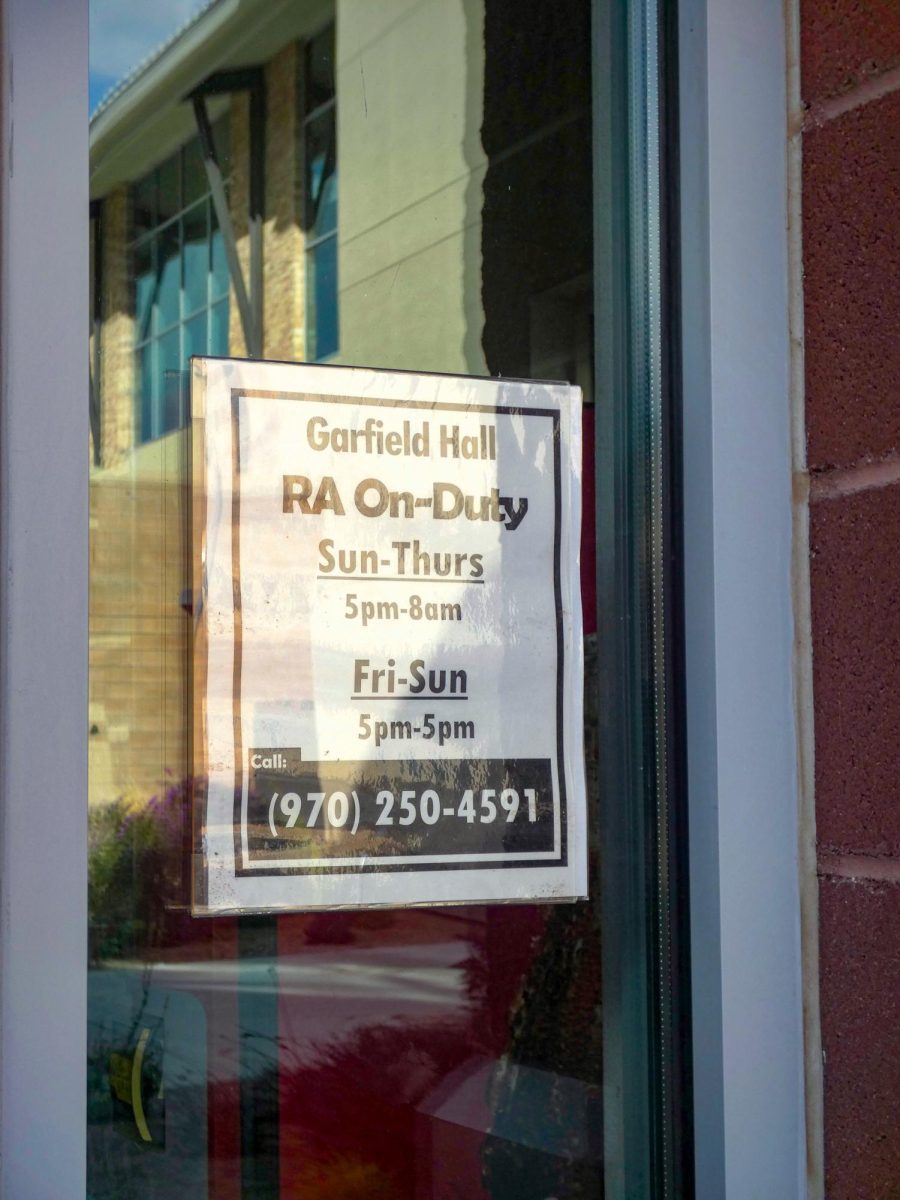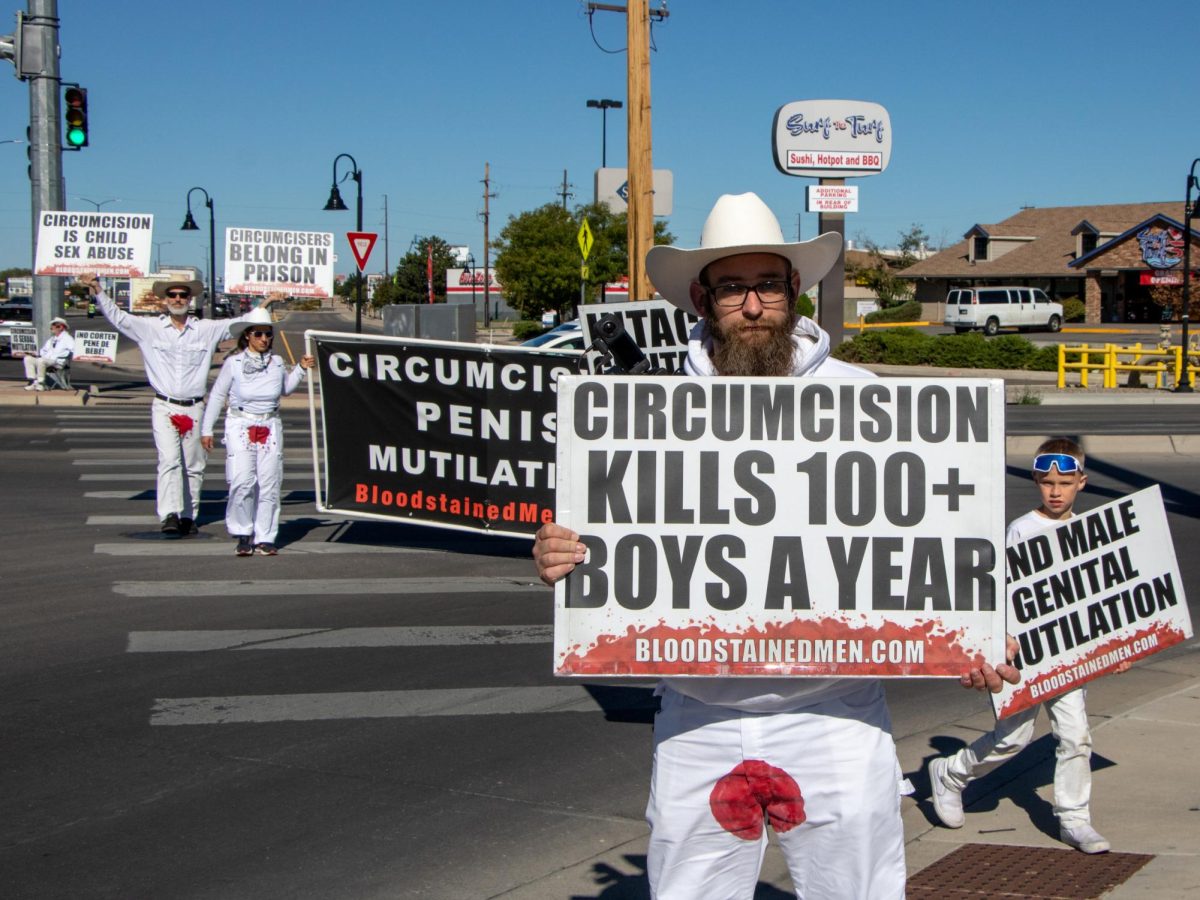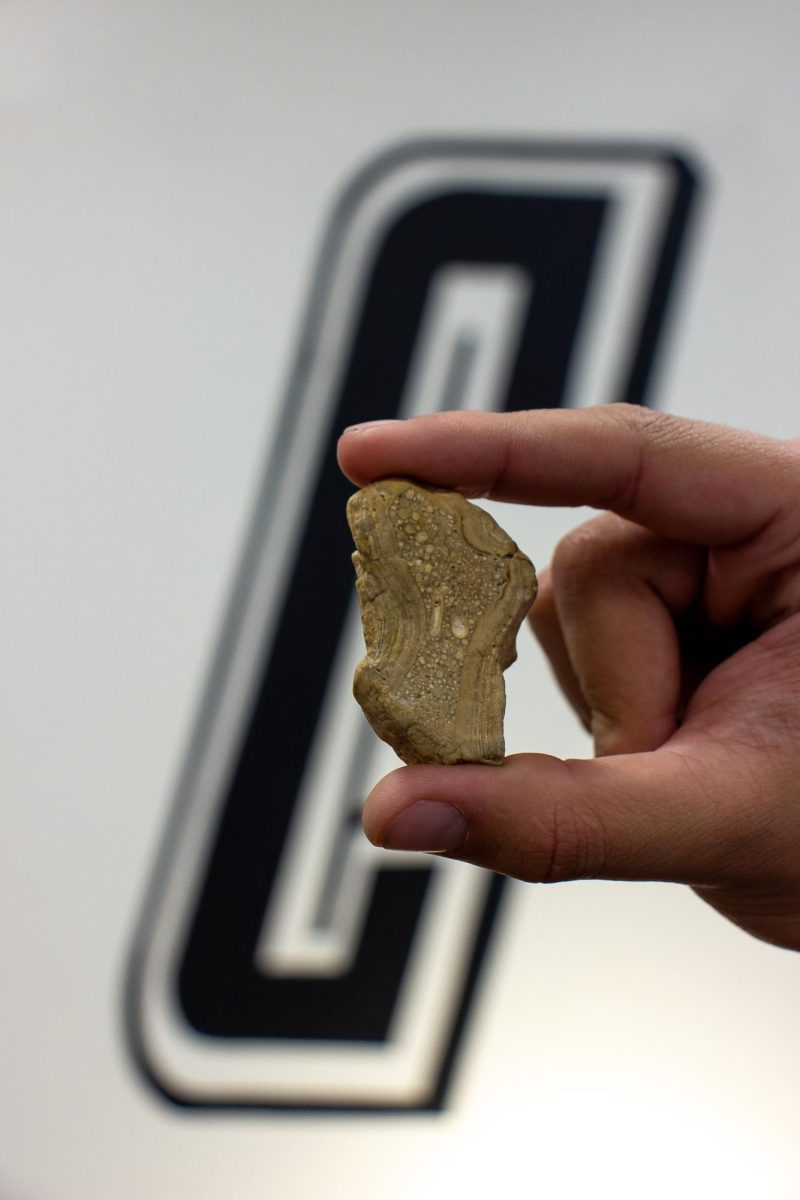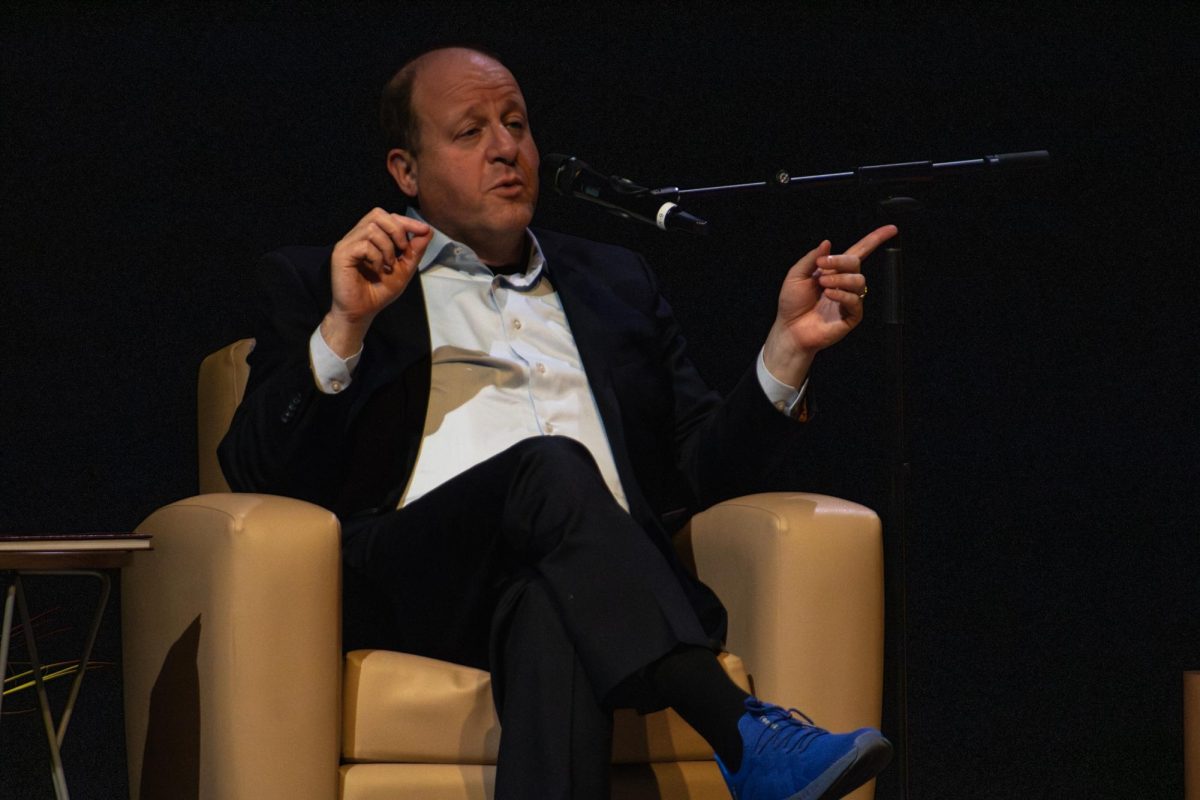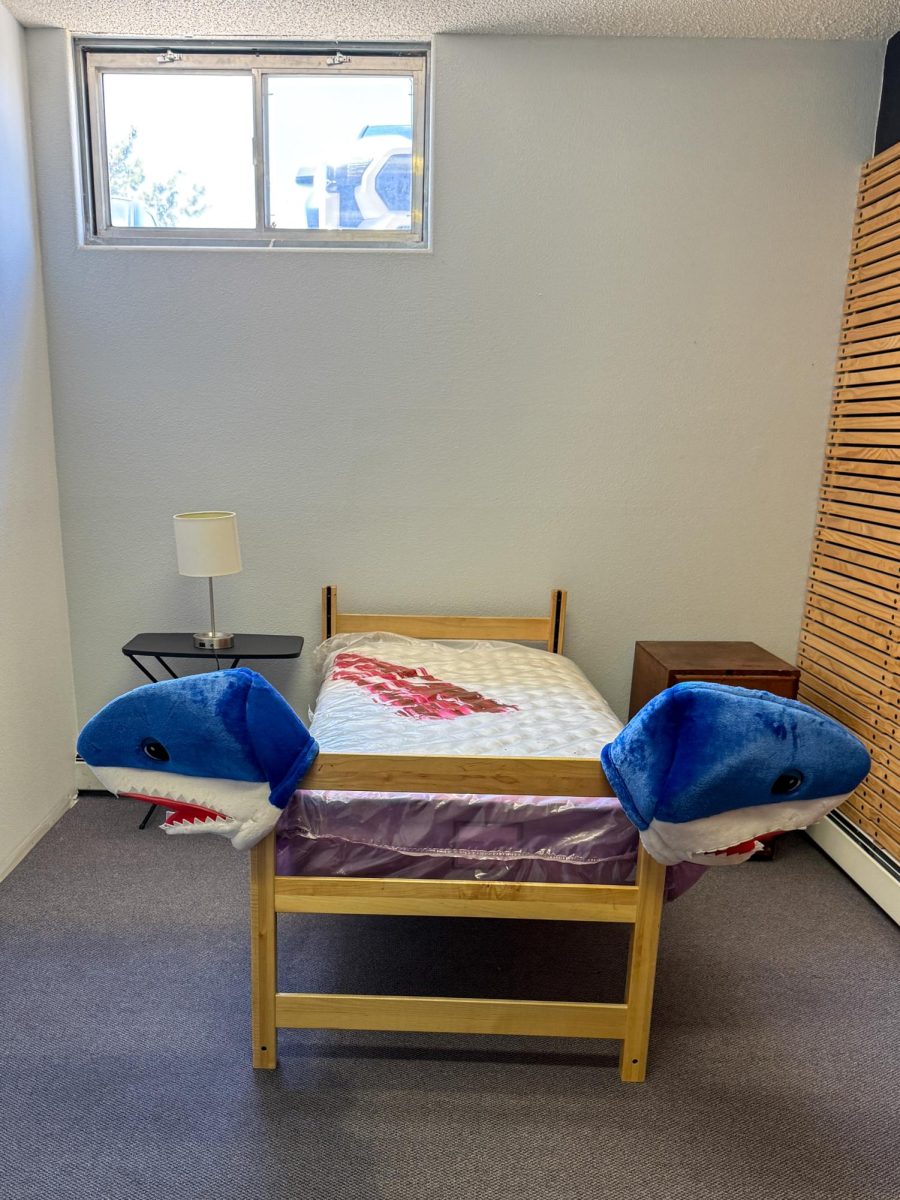The final day of March marked the beginning of Colorado Mesa University’s (CMU) 21st Annual Holocaust Awareness Week. Events hosted throughout the week worked to educate the community about the atrocities of modern genocide not just at the hands of the Nazi regime, but also on a global scale.
Starting with the “Field of Flags,” constructed by attendees in the center field outside of Wubben, this display served as a reminder of the millions of lives lost during the Holocaust. Each flag represents 5,000 lives and each color represents the different groups targeted by the Nazi regime.
“I think that it is important to remember past events that we’re maybe not as excited to talk about or remember so that we don’t return to that point,” said sophomore medical lab tech major Abigail Tomkins.
Tomkins said that the flag display helped her understand the level of atrocity.
“Being able to visualize it has definitely been mind-opening to me,” said Tomkins.
Like always, the display remained up for the duration of the series.
The founding director of the series is Associate Professor of History Dr. Vincent Patarino. After a shocking, white-supremacist message found on the doorstep of his home shortly after moving to Grand Junction about 22 years ago, Patarino took it upon himself to begin this awareness campaign.
“My first inclination was ‘holy crap, where the hell am I now teaching?’” said Patarino.
His goal is to educate the community about the Holocaust and genocide.
“We as a university have a responsibility to deal with these kinds of issues. If we throw out the words of ‘never again’ it actually has to mean something. We have to have discussion, we have to challenge ourselves, we have to deal with things that are very uncomfortable,” said Patarino.
Sessions were presented by Assistant Professor of Political Science Dr. Holly Oberle, Adjunct English Instructor Jessica Bertrand and the CMU Chapter of Phi Alpha Theta. They all share the central theme of modern genocide but on different levels.
Oberle presented “Gendercide: A Comparative, Historical and Global Discussion.” She took a deep dive into the systemic killing of a particular sex. Using modern examples from around the globe, she analyzed selective sex abortion policies, forced conscription and the misunderstanding of sex and gender.
Bertrand presented on the Rohingya, a minority Muslim population in Myanmar. She discussed the detrimental role Facebook played in fomenting anger against the minority. In 2019, Gambia brought an accusation of genocide against Myanmar to the Hague. This makes it one of the most recent examples of genocide apart from Palestine.
Phi Alpha Theta hosted an interactive discussion to talk about the steps an average citizen can take to prevent genocide.
There was also a showing of the documentary “Paper Clips” which depicts and highlights the emotional journey of a small town in Tennessee as they try to understand the scale of losing 6 million lives.
The last event, in partnership with the CMU Civic Forum, was a presentation by Pulitzer Prize-winning columnist Brett Stephens discussing anti-semitism and the need for condemnation. It was followed by an audience Q&A moderated by CMU trustee David Foster and President John Marshall.
The past decade has seen a steady uptick in openly anti-semitic rhetoric and Holocaust denial. The election of Donald Trump and the conflict between Palestine and Israel has fueled this rhetoric. Patarino said this series becomes even more relevant in light of this tense social climate.
Support for Palestinian liberation from Israel has recently been conflated with anti-semitism. While there were no sessions that addressed it directly, Patarino expected it to be discussed in some way during the series. He also says that it isn’t a simple binary even though political lines in the US are often drawn that way.
“If we say we do not support an action that Israel takes, are we fomenting anti-semitism? To me, the answer is no, because Israel is a government,” said Patarino.
He said that he’s not afraid of the controversial topic but hosting a session on it would be tough considering the rapidly changing evolution of the conflict.
According to the US Holocaust Memorial Memorial, denial or distortion of the Holocaust is a form of anti-semitism and it takes many forms. It is based on a rationale that lies at the center of Jewish stereotypes developed by white-supremacists and neo-nazis.
“Some people will say that it didn’t happen because they don’t want to experience reality,” said Tomkins. “It’s not a comfortable feeling for them to say that they had their entire society collapse to a point where they were taking groups of people and committing genocide and justifying it by saying that they’re different or not contributing enough to society.”
Phi Alpha Theta member and senior secondary education major Amy Parkes said this series and ones like it are critical to educating the younger generation about genocide so that they understand how it happened and how to make sure it never happens again.
“Right now I’m at a middle school for internship and a lot of those kids are like ‘Why do we learn this? What’s the point?’” said Parkes. “But this is a good thing to always remember we don’t want things like this to happen again.”
This series serves as a educational opportunity to learn more of the atrocity of genocide around the world. CMU is one of the few schools in the western half of the United States that hosts an annual series like this. All events were free and open to the public.
The final day of March marked the beginning of Colorado Mesa University’s (CMU) 21st Annual Holocaust Awareness Week. Events hosted throughout the week worked to educate the community about the atrocities of modern genocide not just at the hands of the Nazi regime, but also on a global scale.
Starting with the “Field of Flags,” constructed by attendees in the center field outside of Wubben, this display served as a reminder of the millions of lives lost during the Holocaust. Each flag represents 5,000 lives and each color represents the different groups targeted by the Nazi regime.
“I think that it is important to remember past events that we’re maybe not as excited to talk about or remember so that we don’t return to that point,” said sophomore medical lab tech major Abigail Tomkins.
Tomkins said that the flag display helped her understand the level of atrocity.
“Being able to visualize it has definitely been mind-opening to me,” said Tomkins.
Like always, the display remained up for the duration of the series.
The founding director of the series is Associate Professor of History Dr. Vincent Patarino. After a shocking, white-supremacist message found on the doorstep of his home shortly after moving to Grand Junction about 22 years ago, Patarino took it upon himself to begin this awareness campaign.
“My first inclination was ‘holy crap, where the hell am I now teaching?’” said Patarino.
His goal is to educate the community about the Holocaust and genocide.
“We as a university have a responsibility to deal with these kinds of issues. If we throw out the words of ‘never again’ it actually has to mean something. We have to have discussion, we have to challenge ourselves, we have to deal with things that are very uncomfortable,” said Patarino.
Sessions were presented by Assistant Professor of Political Science Dr. Holly Oberle, Adjunct English Instructor Jessica Bertrand and the CMU Chapter of Phi Alpha Theta. They all share the central theme of modern genocide but on different levels.
Oberle presented “Gendercide: A Comparative, Historical and Global Discussion.” She took a deep dive into the systemic killing of a particular sex. Using modern examples from around the globe, she analyzed selective sex abortion policies, forced conscription and the misunderstanding of sex and gender.
Bertrand presented on the Rohingya, a minority Muslim population in Myanmar. She discussed the detrimental role Facebook played in fomenting anger against the minority. In 2019, Gambia brought an accusation of genocide against Myanmar to the Hague. This makes it one of the most recent examples of genocide apart from Palestine.
Phi Alpha Theta hosted an interactive discussion to talk about the steps an average citizen can take to prevent genocide.
There was also a showing of the documentary “Paper Clips” which depicts and highlights the emotional journey of a small town in Tennessee as they try to understand the scale of losing 6 million lives.
The last event, in partnership with the CMU Civic Forum, was a presentation by Pulitzer Prize-winning columnist Brett Stephens discussing anti-semitism and the need for condemnation. It was followed by an audience Q&A moderated by CMU trustee David Foster and President John Marshall.
The past decade has seen a steady uptick in openly anti-semitic rhetoric and Holocaust denial. The election of Donald Trump and the conflict between Palestine and Israel has fueled this rhetoric. Patarino said this series becomes even more relevant in light of this tense social climate.
Support for Palestinian liberation from Israel has recently been conflated with anti-semitism. While there were no sessions that addressed it directly, Patarino expected it to be discussed in some way during the series. He also says that it isn’t a simple binary even though political lines in the US are often drawn that way.
“If we say we do not support an action that Israel takes, are we fomenting anti-semitism? To me, the answer is no, because Israel is a government,” said Patarino.
He said that he’s not afraid of the controversial topic but hosting a session on it would be tough considering the rapidly changing evolution of the conflict.
According to the US Holocaust Memorial Memorial, denial or distortion of the Holocaust is a form of anti-semitism and it takes many forms. It is based on a rationale that lies at the center of Jewish stereotypes developed by white-supremacists and neo-nazis.
“Some people will say that it didn’t happen because they don’t want to experience reality,” said Tomkins. “It’s not a comfortable feeling for them to say that they had their entire society collapse to a point where they were taking groups of people and committing genocide and justifying it by saying that they’re different or not contributing enough to society.”
Phi Alpha Theta member and senior secondary education major Amy Parkes said this series and ones like it are critical to educating the younger generation about genocide so that they understand how it happened and how to make sure it never happens again.
“Right now I’m at a middle school for internship and a lot of those kids are like ‘Why do we learn this? What’s the point?’” said Parkes. “But this is a good thing to always remember we don’t want things like this to happen again.”
This series serves as a educational opportunity to learn more of the atrocity of genocide around the world. CMU is one of the few schools in the western half of the United States that hosts an annual series like this. All events were free and open to the public.
The final day of March marked the beginning of Colorado Mesa University’s (CMU) 21st Annual Holocaust Awareness Week. Events hosted throughout the week worked to educate the community about the atrocities of modern genocide not just at the hands of the Nazi regime, but also on a global scale.
Starting with the “Field of Flags,” constructed by attendees in the center field outside of Wubben, this display served as a reminder of the millions of lives lost during the Holocaust. Each flag represents 5,000 lives and each color represents the different groups targeted by the Nazi regime.
“I think that it is important to remember past events that we’re maybe not as excited to talk about or remember so that we don’t return to that point,” said sophomore medical lab tech major Abigail Tomkins.
Tomkins said that the flag display helped her understand the level of atrocity.
“Being able to visualize it has definitely been mind-opening to me,” said Tomkins.
Like always, the display remained up for the duration of the series.
The founding director of the series is Associate Professor of History Dr. Vincent Patarino. After a shocking, white-supremacist message found on the doorstep of his home shortly after moving to Grand Junction about 22 years ago, Patarino took it upon himself to begin this awareness campaign.
“My first inclination was ‘holy crap, where the hell am I now teaching?’” said Patarino.
His goal is to educate the community about the Holocaust and genocide.
“We as a university have a responsibility to deal with these kinds of issues. If we throw out the words of ‘never again’ it actually has to mean something. We have to have discussion, we have to challenge ourselves, we have to deal with things that are very uncomfortable,” said Patarino.
Sessions were presented by Assistant Professor of Political Science Dr. Holly Oberle, Adjunct English Instructor Jessica Bertrand and the CMU Chapter of Phi Alpha Theta. They all share the central theme of modern genocide but on different levels.
Oberle presented “Gendercide: A Comparative, Historical and Global Discussion.” She took a deep dive into the systemic killing of a particular sex. Using modern examples from around the globe, she analyzed selective sex abortion policies, forced conscription and the misunderstanding of sex and gender.
Bertrand presented on the Rohingya, a minority Muslim population in Myanmar. She discussed the detrimental role Facebook played in fomenting anger against the minority. In 2019, Gambia brought an accusation of genocide against Myanmar to the Hague. This makes it one of the most recent examples of genocide apart from Palestine.
Phi Alpha Theta hosted an interactive discussion to talk about the steps an average citizen can take to prevent genocide.
There was also a showing of the documentary “Paper Clips” which depicts and highlights the emotional journey of a small town in Tennessee as they try to understand the scale of losing 6 million lives.
The last event, in partnership with the CMU Civic Forum, was a presentation by Pulitzer Prize-winning columnist Brett Stephens discussing anti-semitism and the need for condemnation. It was followed by an audience Q&A moderated by CMU trustee David Foster and President John Marshall.
The past decade has seen a steady uptick in openly anti-semitic rhetoric and Holocaust denial. The election of Donald Trump and the conflict between Palestine and Israel has fueled this rhetoric. Patarino said this series becomes even more relevant in light of this tense social climate.
Support for Palestinian liberation from Israel has recently been conflated with anti-semitism. While there were no sessions that addressed it directly, Patarino expected it to be discussed in some way during the series. He also says that it isn’t a simple binary even though political lines in the US are often drawn that way.
“If we say we do not support an action that Israel takes, are we fomenting anti-semitism? To me, the answer is no, because Israel is a government,” said Patarino.
He said that he’s not afraid of the controversial topic but hosting a session on it would be tough considering the rapidly changing evolution of the conflict.
According to the US Holocaust Memorial Memorial, denial or distortion of the Holocaust is a form of anti-semitism and it takes many forms. It is based on a rationale that lies at the center of Jewish stereotypes developed by white-supremacists and neo-nazis.
“Some people will say that it didn’t happen because they don’t want to experience reality,” said Tomkins. “It’s not a comfortable feeling for them to say that they had their entire society collapse to a point where they were taking groups of people and committing genocide and justifying it by saying that they’re different or not contributing enough to society.”
Phi Alpha Theta member and senior secondary education major Amy Parkes said this series and ones like it are critical to educating the younger generation about genocide so that they understand how it happened and how to make sure it never happens again.
“Right now I’m at a middle school for internship and a lot of those kids are like ‘Why do we learn this? What’s the point?’” said Parkes. “But this is a good thing to always remember we don’t want things like this to happen again.”
This series serves as a educational opportunity to learn more of the atrocity of genocide around the world. CMU is one of the few schools in the western half of the United States that hosts an annual series like this. All events were free and open to the public.
